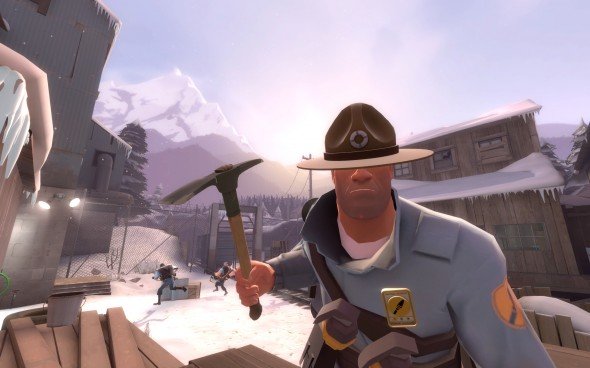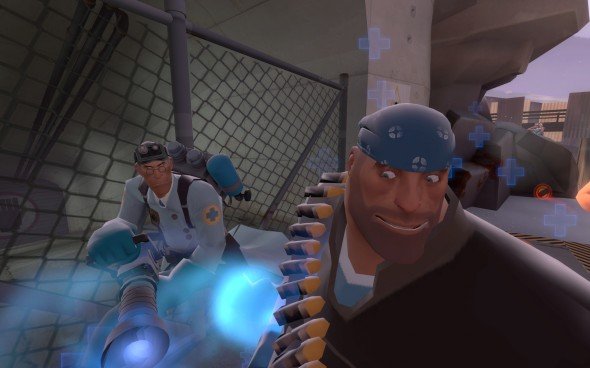Interview: Valve on the future of Team Fortress 2
PC Gamer: How's it doing commercially? I spoke to you around the time of the Sniper/Spy one, and you said your maximum concurrent users had doubled as the result of that update. Is that still happening?
Robin Walker: We vary across different updates. The Engineer's probably the most successful update. That's if you ignore the Spy/Sniper update, when we made it so that no-one could get their items through achievements. Spy/Sniper was the first update when we said “here are a set of new items but you don't get them, you have to wait for them to drop randomly”.
We changed our mind on that, because it was kind of cruel. We saw a massive inflation of the player numbers there, players who we don't think were having fun in the way that we like them to have fun. Once we added achievements for the Sniper/Spy items pretty shortly afterwards the numbers dropped down dramatically.
If we ignore that specific spike, the Engineer update is our most successful update that drove a huge number of concurrent players and we're quite happy with the response across the board on that. The reality is, any updates like this over time are hard to compete with the amount of money we can make on Portal 2.
For us it's not about money, right? There's a lot of other value we get. We really like the fact that we're making a lot of customers really happy. We think that has a huge amount of value. We like the fact we're exploring. We've learned a ton about how to do this kind of thing. This sort of process is important long term for maintaining the kind of products that we think are going to be very important in the future. Both for us, and for other people.

PC Gamer: If you were a new company and TF2 was your first game, and you'd made a decent amount of money from selling it in the first place, would you be able to sustain yourself with free updates, just from the sales that come from that?
Robin Walker: It's a hard question. Valve can do that. We made more money than it costs us to maintain TF, but we have a lot of other methods to make that money. You need to be able to generate visibility at the level that we're able to generate, and you need to be able to translate that into sales. It's a hard question. I think that's true of any business proposition. If you look at any way that someone else runs their business, you need to be very careful about assuming that if it succeeds for them, it'll work for you, right? That's just the reality.
The biggest gaming news, reviews and hardware deals
Keep up to date with the most important stories and the best deals, as picked by the PC Gamer team.
PC Gamer: Are there any class updates that you've done that you feel you need to revisit?
Robin Walker: I don't think there are whole updates or anything. There's always things we'd like to tune a little better. The shortlist of them right now is probably,
1) I think Natascha is a little too powerful right now.
2) we're still not super happy with the Sandman but we might just call done on it. Lesson learned and move on.
There's still things to try with various numbers here and there. But we have a set of larger scale things that we're interested in trying out that we can't try out internally.
An example of that would be something like, what happens when everyone has ten times as much health, or everyone has ten health? We'd like to know, not necessarily because we think that's the way it should be, but what do we learn when we do that? What happens when combat takes minutes to resolve instead of seconds? What are the effects of that kind of change on all the other systems in the game?
There are systems in the game that are tuned to specific numbers. The amount of damage the sniper rifle does fully charged, for instance. On a headshot it's specifically tuned to the health of the other class, so there would be damage numbers we'd need to change. It's hard for us to run that test and get good data, so, we're probably going to gear up the TF2 public beta again soon and make it publicly available to everyone who owns TF. We'll start running some more wide scale experiments there.
I should say now: we're not proposing this as a change to TF2. It's more about how can we use this system we have to teach us some other things that might be useful in TF and might be useful in other games.
PC Gamer: So, game design lessons in general then?
Robin Walker: Yeah. One of the things we're about to deploy is a large scale overhaul of the stat tracking in TF. We'll be collecting way more data and have a much much better way of combing through it, and we'll ultimately be providing public API's to that sort of stuff so anyone out there who wants to go stats crazy about TF can do that. There are all kinds of interesting questions you ask yourself as a designer. When you have other products that have been successful it's hard to know what are the pieces that made that product successful, and one of the ways you can do that is to start messing with them and trying pieces out.

One of the characteristics you see amid some of the very successful FPS's like Counter-Strike and Modern Warfare is that they tend to have very lethal combat. More lethal than we have, but we never have a customer say “we wish the combat was more lethal in Team Fortress”. We do occasionally get customers saying they wish it was less lethal.
Those are interesting pieces of competing data. Now it might be completely irrelevant to the success of Counterstrike and Modern Warfare and their success is completely due to different things, but if you had a large scale system you could test that change in, you'd get a whole lot of data back, both from from customer feedback, but also data back in terms of what happens to the average time it takes for maps to resolve? What happens to stalemates? We'd love to be able to run that experiment, we're at a point where we can run that experiment, and we should run that experiment, so let's run the sucker and see what happens.
PC Gamer: It seems like the tension's between: combat with loads of hit points gets more strategic, the difference between the power of different weapons is much more significant, but the trade off is that it's incredibly unconvincing and it doesn't feel very satisfying.
Robin Walker: Theoretically, the longer combat takes to resolve, the more affect skill can have on it, right? If you think of every input into the game is an opportunity for you to demonstrate higher skill than me, then the greater the time, the more input, the more opportunity for the greater disparity we should see between low and high skill players in terms of combat outcomes.
This is all theoretical. The interesting stuff is often the stuff you can't see on paper, when you run it through the actual system of having real players playing with it that you'll start to see the interesting things. Most likely what will happen, based on my experiences in the past, is that you won't really find out overall whether it's a good change to make, what you'll find out a bunch of places where parts of the system change, hopefully in ways that are interesting to observe.
PC Gamer: I think that's why Half Life 2 Deathmatch is the best game Valve's ever done. Because when you get into a duel with someone with a gravity gun you can catch what they throw at you and throw it back to them. If that's all you're playing with then that can go on for five minutes.
Robin Walker: We'll have to add Gordon to TF2.
PC Gamer: Yeah, that'd be great, he could be the tenth class.
Robin Walker: It'll be like Half Life 2 CTF all over again.

